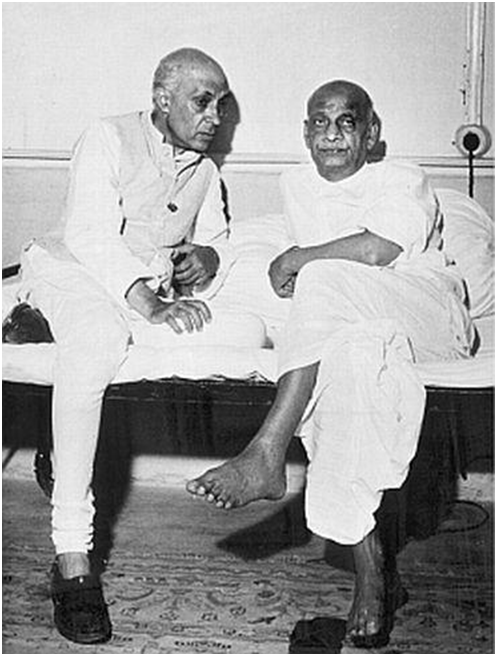Sardar Patel was Right to Ban the RSS
Jawaharlal Nehru and Sardar Patel

Pandit Jawaharlal Nehru and Sardar Vallabhbhai Patel are the two icons of the freedom movement. One was left of the centre and the other right of the centre but they sank their ideological differences to win freedom.
After Independence, Nehruvian thoughts came to influence the country because he was the most popular leader and his thoughts fitted into the general sentiment of pluralism in the country. Naturally, the name of Sardar Patel receded.
Prime Minister Narendra Modi has refurbished the past and brought Patel’s name to the fore by celebrating his birthday as Rashtriya Ekta day. It however goes to the credit of Modi that unlike his party, the Bharatiya Janata Party (BJP) he has not devalued the role which Nehru played in freeing and building of the country. The BJP has not mentioned in its manifesto Nehru among the freedom fighters and builders of the nation.
There are people who believe that India’s interests would have been served better if Sardar Patel, in place of Jawaharlal Nehru, had been the country’s Prime Minister. This hypothetical possibility had been voiced by Prime Minister Narendra Modi when he was Gujarat chief minister.
Of all the leaders, Maulana Abul Kalam Azad, Nehru’s guide and philosopher, came to the same conclusion after watching Nehru as an administrator. Azad was in Nehru’s cabinet and saw him from close quarters. Azad told his secretary, Humayun Kabir, that they should have made Nehru the country’s president and Patel its prime minister.
By no stretch of imagination, Azad can be linked with Patel or his philosophy. During the national struggle, both ardent participants, were poles apart and made no secret of their stance. Patel was a pro-Hindu but strictly adhered to pluralism. Azad was secular through and through and boldly faced the charge of “Hindu show boy” that the Muslim League made against him. He did not flinch even for a second to say publicly that the formation of Pakistan would be harmful to the interest of Muslims.
He would say before partition that the Muslims could walk proudly in the country with their heads held high that they were equal partners, even though they were fewer in numbers. Once India was divided on the basis of religion, the Hindus would tell the Muslims that you had taken their share and should, therefore, go to Pakistan.
Even after 67 years of division, this approach has not been disowned either in India or Pakistan. The latter, Pakistan has ousted practically all Hindus. However, the Muslims in India continue to be a target of fanatics. When there is a tension between the two countries, many Hindus refer to Muslims as Pakistanis. Little purpose will be served in pursuing this point because the wounds of partition are far from healed and the people in both the communities continue to be exploited in the name of religion.
Left to Patel, he would have had an exchange of population before accepting partition. Nehru was different. He did not mix religion with politics or the state. The distance in separation in their approach made Mahatma Gandhi, who led the war of independence, to nominate Nehru as his successor. The Hindu-Muslim unity was a matter of faith with Gandhiji, not part of the policy.
Gandhiji and Patel came from the same state, Gujarat, ate the same food and represented the traditions of the state in many ways. Yet Gandhiji preferred Nehru to Patel. Gandhiji knew that Nehru even dreamt in English and that he was too much engrossed in world affairs. But Gandhiji also knew that Nehru would interpret his philosophy of Hindu-Muslim unity more faithfully and employ such methods to implement it that respected scruples and were non-violent and fair.
The typical example is that of Travancore. It announced its independence and initiated the process of seceding. VP had a man in khaki when he went to the Travancore maharaja. He signed the instrument of accession. He explained subsequently that he did not want his family to suffer and spend years in jail.
Gandhiji was also confident that his secular ideals would be safer in the hands of Nehru. This was proved when Patel refused to release Rs. 64 crore to Pakistan. This sum was part of assets which India had agreed to transfer while agreeing to the partition details. Patel argued that how could he release the money when India and Pakistan was engaged in a war over Kashmir. Gandhiji had to go on fast unto death to make Patel relent.
The extremist Hindus had vitiated the atmosphere of amity over the sum of Rs. 64 crore. The society was sought to be polarized. They criticized Gandhiji again and again for being anti-national and anti-Hindu. The RSS, the fallout of Hindu Mahasabha’s philosophy of Hindutva, hatched a conspiracy and shot Gandhiji dead.
Patel was quite right in banning the RSS and blaming it for disturbing the atmosphere of secularism. Once again the slant of Patel towards the RSS made him withdraw the ban once the organization changed its character to become a cultural organization. This was only a smokescreen behind which the RSS used the BJP for its political activities. Modi is its candidate. In fact, RSS chief Mohan Bhagwat has openly said that the outfit would be participating in politics. Nehru had exposed the duplicity of the RSS.
When Azad thought Nehru’s suitability for the office of President, he was confident that the communal forces had been crushed. He commended Patel’s quality of being pragmatic and practical. Azad had come to have full faith in Patel’s secular aptitude. That Modi is using Patel’s image for polarizing society is unfortunate. Practical as Patel was, he would have understood that India’s destiny lay in a democratic, secular polity. He, as prime minister, would have deepened its foundation more firmly than Nehru.



